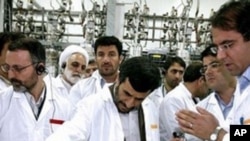Iran's nuclear chief is denying claims that technical problems have set back Iran's efforts to enrich uranium, and says the Stuxnet computer worm did not harm the country's atomic program.
Ali Akbar Salehi said Tuesday that Iran's enemies "failed to achieve their goal" of using the computer virus to disrupt Iran's nuclear endeavors.
Salehi said Iran will begin producing nuclear fuel for a research reactor next September. He called production of 20 percent enriched uranium a "firm response to the West."
News organizations on Tuesday cited a confidential IAEA report that says Iran temporarily stopped its uranium enrichment activities for at least one day earlier this month. The report did not specify the reason for the halt.
The restricted IAEA report also says Iran remains uncooperative after nearly eight years of international attempts to determine if the Iranian nuclear program is peaceful. It says Tehran continues to enrich uranium in defiance of the U.N. Security Council.
U.S. State Department spokesman Mark Toner said Tuesday the IAEA's latest report underscores Tehran's "continued failure" to comply with its international nuclear obligations.
A separate report on Syria by the U.N. nuclear agency notes similar stonewalling by the Syrian government. That report says Syria has refused U.N. nuclear inspectors access to numerous suspect sites and has provided scant or inconsistent information about its atomic activities.
On Monday, IAEA officials said Tehran had removed hundreds of its centrifuges used to enrich uranium at its nuclear facility in Natanz.
They say thousands of the approximately 8,500 centrifuges in the facility are running below capacity or are shut down.
The United Nations imposed sanctions on Iran for its refusal to stop enriching uranium. Other countries have imposed additional penalties.
Many Western countries believe Iran aims to use its uranium enrichment program to build atomic weapons, a charge Tehran denies.
Cyber security experts have described Stuxnet as a "super weapon" that appears to be specifically designed to target installations such as power plants. They say nearly 60 percent of the computers discovered to be infected with the virus are in Iran.
Nuclear experts say the Stuxnet virus may have disrupted the Iranian centrifuges and caused them to spin out of control.
Some information for this report was provided by AP, AFP and Reuters.




